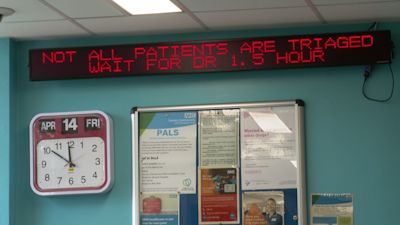Medical urgent treatment centres braced for weekend surge as junior doctors' strike ends

ITV News Meridian's Kit Bradshaw reports from the Urgent Treatment Centre in Crawley, West Sussex
NHS bosses fear that accident and emergency departments across the South could be extremely busy this weekend as the four-day junior doctors' strike comes to an end.
The public are being urged to attend walk-in clinics instead of A&E departments, if their condition is not life-threatening.
In Crawley, the NHS Urgent Treatment Centre has not been as busy as managers had expected over recent days, despite junior doctors walking out.
Clinical Services Manager Louise Winter said: "People, I think, have been staying away from the centres because of the the doctor strikes, which we saw happened over the paramedic strikes as well.
"We would encourage people to come and use urgent treatment centres and minor injury units. We have got a wide range of centres across Sussex, so please contact them before you go and use your own department."
The Crawley unit is one of nine similar walk-in centres in Sussex, with health leaders encouraging more people to make use of them.
NHS Sussex Chief Medical Officer, Dr Dinesh Sinha, said: "Health and care organisations in Sussex are working together to maintain patient safety, and emergency and critical care will be prioritised and will continue to be available for those who need it, and we urge the public to help us by using the right service to meet their needs."
The health service has been under significant pressure with new figures revealing the extend of which thousands of patients face more than 12 hour waits to be seen at A&E.
In February, at East Kent Trust Hospitals one in four had to wait over 12 hours.
On the Isle of Wight, more than 15 per cent of patients had to wait more than 12 hours. That's 535 people.
Meanwhile, 1400 patients had to wait that long at the Royal Bournemouth and Poole Hospital and at the QA in Portsmouth it was more than a thousand patients.
Prime Minister Rishi Sunak has made cutting waiting lists one of his priorities for 2023, pledging in January that "lists will fall and people will get the care they need more quickly".
Professor Stephen Powis, NHS national medical director for England, said: "The last few months have been demanding for the NHS as record numbers of patients have come forward for care on top of hugely disruptive strike action.
"Today's data shows demand on services is not relenting, with A&E attendances and ambulance call-outs in March recorded at the highest level so far this year even higher than a very busy January.
"But amid the demand and industrial action, staff have progressed on key NHS priorities, with the number of people waiting the longest for elective care continuing to reduce while for the first time ever the NHS has also hit the faster diagnosis standard for cancer - with more patients getting a definitive diagnosis or the all-clear within 28 days."